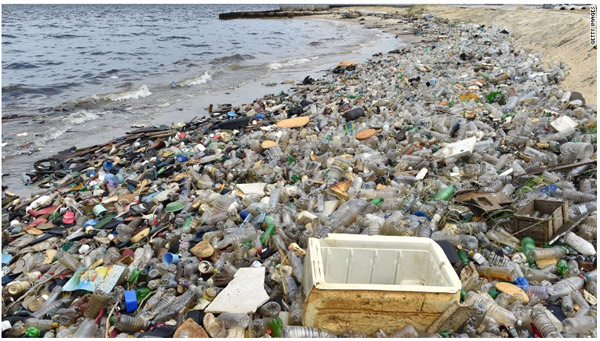Š¤ÄÕøĮõ║║µ»ÅÕż®µēöµÄēńÜäÕÉĖń«ĪŁæ│õ╗źŠlĢÕ£░ńÉāõĖżÕ£łŃĆéÕĪæµ¢ÖÕÉĖĮÄĪµś»õĖ¢ńĢīĮW¼ÕģŁÕż¦ÕĖĖĶ¦üÕ×āÕ£Š’╝īĶĆīõĖöśqśµś»ÕŹüÕż¦ŗ╣õh┤ŗÕ×āÕ£Šõ╣ŗõĖĆŃĆéõ╣¤×«▒µś»Ķ»▀_(d©ó)╝īŗ╣õh┤ŗõĖŖµ╝éŗ╣«ńÜäÕż¦ńēćÕĪæµ¢ÖÕ×āÕ£ŠÕQīµ£ēÕŠłÕż¦õĖĆķā©Õłåµś»ÕĪæµ¢ÖÕÉĖĮÄĪŃĆéń£ŗõ╝ķgĖŹĶĄ’L(f©źng)£╝ńÜäÕ░Å׫ÅÕĪæµ¢ÖÕÉĖĮÄĪõĖŹõ╗ģÕ£©µČłĶĆŚńØƵ£ēķÖÉńÜäń¤│µ▓╣ĶĄäµ║É’╝īĶĆīõĖöÕćĀõ╣ÄõĖŹõ╝Ü(x©¼)Ķó½Õø×µöČÕł®ńö©’╝īõ╣¤õĖŹĶāĮĶó½ńö¤ńē®ķÖŹĶ¦ŻÕQīµēĆõ╗źõ╝Ü(x©¼)Õ»╣ńÄ»ÕóāÕÆīńö¤µĆüķĆĀµłÉÕĘ©Õż¦ńĀ┤ÕØÅŃĆéĶ┐ćÕÄšdćĀ“q▀_(d©ó)╝īĶŗ▐qŠÄĮ{ēÕøĮÕ╝ĆÕ¦ŗÕÅæĶĄĘÕÉä┐UŹÕÉĖĮÄĪĶ┐ÉÕŖ©’╝īµØźÕćÅ׫æõØhõ╗¼Õ»╣ÕÉĖń«ĪńÜäõŗ╔ńö©ŃĆ?/span>

µł¬ÕøŠµØźĶć¬CNNŠ|æń½Ö
Every day, Americans throw away 500 million plastic straws, enough to circle the Earth twice, or fill 125 school buses. µ»ÅÕż®Š¤ÄÕøĮõ║║ķāĮĶ”üµēöµÄ?õ║┐µĀ╣ÕĪæµ¢ÖÕÉĖń«ĪÕQīĶā÷õ╗źń╗ĢÕ£░ńÉāõĖżÕ£łÕQīµł¢ĶĆģĶŻģµ╗?25ĶŠåµĀĪĶĮ”ŃĆ?
Made from fossil fuels, they are almost never recycled because they're too small and could be made from several different types of plastic. They simply contribute to the massive problem of plastic pollution; eight million tons of plastic is dumped into the oceans every year. ńö©Õī¢ń¤│ńćāµ¢ÖÕłČµłÉńÜäÕĪæµ¢ÖÕÉĖń«ĪÕćĀõ╣Äõ╗ÄµØźõĖŹõ╝Ü(x©¼)Ķó½Õø×µöČÕł®ńö©’╝īÕøĀõžō(f©┤)Õ«āõ╗¼õĮōń¦»Õż¬Õ░ÅÕQīĶĆīõĖöÕÅ»ĶāĮµś»ńö▒ÕźĮÕćĀ┐UŹõĖŹÕÉīń▒╗Õ×ŗńÜäÕĪæµ¢ÖÕłČµłÉńÜäŃĆéĶ┐Öõ║øÕÉĖĮÄĪńø┤µÄźÕŖĀÕē¦õ║å(ji©Żn)ÕĪæµ¢Öµ▒Īµ¤ōńÜäõĖźķćŹķŚ«ķóś’╝īµ»ÅÕ╣┤ķāĮõ╝Ü(x©¼)µ£?00õĖćÕÉ©ÕĪæµ¢ÖĶó½ÕĆæųĆÆĶ┐øŗ╣õh┤ŗõĖŁŃĆ?
׫ÅÕ░ÅńÜäÕĪæµ¢ÖÕÉĖĮÄĪń½¤ńäČõ╝Ü(x©¼)ķĆĀµłÉŗéśµēŗńÜäńÄ»ÕóāķŚ«ķóś’╝īÕŠłÕżÜµłÉõØhÕÅ»ĶāĮķāĮµ▓Īµ£ēµäÅĶ»åÕł░ÕQīõĮåµś»ńŠÄÕøĮõĖĆõĖ?Õ▓üńÜä׫ÅÕŁ®ÕŹ┤µäÅĶ»åÕł░õ║?ji©Żn)’╝īśqśÕÅæĶĄĘõ║å(ji©Żn)ĮW¼õĖĆÕ£║ÕÅŹÕÉĖń«ĪśqÉÕŖ©ÕQīĶ«®ÕĪæµ¢ÖÕÉĖń«ĪµłÉõžō(f©┤)ÕÅ»ķĆēķĪ╣ŃĆ?
Plastic straws are now the target of a growing movement to reduce their use. Possibly the first of such campaigns, Be Straw Free was started in 2011 by Milo Cress, who was only nine years old at the time. "I noticed that whenever I ordered a drink at a restaurant, it would usually come with a straw in it, and I don't usually need a straw," he said. ńÄ░Õ£©õ╗źÕćÅ׫æÕĪæµ¢ÖÕÉĖĮÄĪõŗ╔ńö©ķćÅõĖ║ńø«µĀćńÜäśqÉÕŖ©ŁæŖµØźŁæŖÕżÜŃĆéŌĆ£õĖŹńö©ÕÉĖĮÄĪŌĆØÕÅ»ĶāĮµś»ĮW¼õĖĆÕ£°Ö┐ÖµĀ’L(f©źng)ÜäśqÉÕŖ©ÕQīĶ»źśqÉÕŖ©Õ£?011“q┤ńö▒“q┤õ╗ģ9Õ▓üńÜäŠc│ńĮŚŌĆóÕģŗķøõh¢»ÕÅæĶōvŃĆéÕģŗķøõh¢»Ķ»▀_(d©ó)╝Ü(x©¼)ŌĆ£µłæµ│©µäÅÕłÄ═╝īµŚĀĶ«║õĮĢµŚČµłæÕ£©śĪÉÕÄģńéÜwź«µ¢Ö’╝īµØ»ÕŁÉķćīµĆųM╝Ü(x©¼)µ£ēÕÉĖĮÄĪ’╝īĶĆīµłæõĖĆĶł¼õĖŹķ£ĆĶ”üÕÉĖĮÄĪŃĆéŌĆ?
"This seemed like a huge waste. Straws are made of oil, a precious and finite resource. Is making single-use plastic straws, which will be used for a matter of minutes before being tossed away, really what we want to do with this resource?" ŌĆ£Ķ┐Öń£ŗĶōvµØźµś»õĖĆõĖ¬ÕĘ©Õż¦ńÜäŗ╣¬Ķ┤╣ŃĆéÕĪæµ¢ÖÕÉĖĮÄĪµś»ńö©ń¤│µ▓╣ÕłČµłÉńÜäÕQīĶĆīń¤│µ▓ęÄ(gu©®)ś»õĖĆ┐UŹÕ«ØĶ┤ļŖÜäµ£ēķÖÉĶĄäµ║ÉŃĆéńö©ń¤Žxča(b©│)ńö¤õ±öµēŹńö©ÕćĀÕłåķƤÕ░▒õĖóµÄēńÜäõĖĆŗŲĪµĆ¦ÕÉĖĮÄĪ’╝īµłæõ╗¼ń£¤ńÜäµāīÖ┐Öõ╣łÕł®ńö©ĶĄäµ║ÉÕÉŚÕQ¤ŌĆ?
Cress started asking restaurants in Burlington, Vermont, where he lived at the time, to stop providing straws automatically to customers and make them optional instead. Many agreed and his request made ripples nationwide. He says that restaurants that make the switch report a reduction in the number of straws they use between 50 and 80%. Õģŗķøʵ¢»Õ╝ĆÕ¦ŗĶ»Ęµ▒éõ╗¢ÕĮōµŚČńÜäÕ▒ģõĮÅÕ£░õĮ?j©®ng)ĶÆÖńē╣ÕĘ×õ╝»ńüĄÖÕ┐ńÜäśĪÉÕÄģÕü£µŁóĶć¬ÕŖ©õĖ║ķĪŠÕ«óµÅÉõŠøÕÉĖĮÄĪ’╝īµö╣õž?f©┤)Ķć¬ķĆēŃĆéĶ«ĖÕżÜķżÉÕÄģķāĮÕÉīµäÅõ║?ji©Żn)’╝īõ╗¢ńÜäĶ»õh▒éõ║¦ńö¤ńÜäÕ¬ä(ji©Żng)ÕōŹÕāÅµČ¤µ╝¬õĖĆĶł¼Õ£©Õģ©ÕøĮµē®µĢŻÕ╝ĆµØźŃĆéõ╗¢Ķ»▀_(d©ó)╝īÕüÜÕć║µö╣ÕÅśńÜäķżÉÕÄģµŖźÕæŖĶ»┤ÕQīµēĆńö©ńÜäÕÉĖń«ĪµĢ░ķćÅÕćÅÕ░æõ║?0%Õł?0%ŃĆ?
ĶĆīÕ£©Õż¦Ķź┐ŗzŗńÜäÕÅ”õĖĆÕż▀_(d©ó)╝īĶŗ▒ÕøĮõ║▐Z╣¤Õ╝ĆÕ¦ŗķććÕÅ¢µÄ¬µ¢ĮÕ║öÕ»╣ÕĪæµ¢ÖÕÉĖĮÄĪķĆĀµłÉńÜ䵥¬Ķ┤╣ÕÆīµ▒Īµ¤ōŃĆéĶŗ▒ÕøĮõĖĆÕ«ČĶ┐×ķöüķģÆÕɦķĆēµŗ®õĮ┐ńö©µ»öÕĪæµ¢ÖÕÉĖĮÄĪµø┤ńÄ»õ┐ØńÜäµø┐õ╗ŻÕōüŃĆ?
The anti-straw sentiment has crossed borders into the UK, where straws have been included in a government plan to ban all plastic waste by 2042. Last year, large pub chain Wetherspoons announced that it would replace plastic straws with paper alternatives across 900 outlets. After the announcement, many smaller chains and pubs across the country followed suit. According to Wetherspoons CEO John Hutson, the move will save 70 million plastic straws a year and the reaction from patrons has been "very positive." ÕÅŹÕÉĖĮÄĪńāŁµĮ«Ķ┐śµē®µĢŻÕłŅC║å(ji©Żn)Ķŗ▒ÕøĮÕQīÕÉĖĮÄĪĶó½ŠUø_ģźõ║?ji©Żn)Ķŗ▒ÕøĮµö┐Õ║£Õ£?042“q┤ÕēŹ╝øüµŁóµēƵ£ēÕĪæµ¢ÖÕ×āÕ£äĪÜäĶ«ĪÕłÆŃĆéÕÄ╗“q▀_(d©ó)╝īÕż¦Õ×ŗśq×ķöüķģÆÕɦWetherspoonsÕ«ŻÕĖāÕQīÕ░åÕ£?00Õ«ČÕłåÕ║ŚõĖŁµŖŖÕĪæµ¢ÖÕÉĖĮÄĪµø┐µŹóõžō(f©┤)ŠUĖÕÉĖĮÄĪŃĆéÕ£©śqÖõ╣ŗÕÉÄ’╝īĶŗ▒ÕøĮĶ«ĖÕżÜõĖŁÕ░ÅÕ×ŗĶ┐×ķöüÕ║ŚÕÆīķģÆÕɦń║ĘŠUõhĢłõ╗čØĆéWetherspoonsÕģ¼ÕÅĖńÜäķ”¢ÕĖŁµē¦ĶĪīÕ«śŠU”ń┐░ŌĆóÕōłńēęÄ(gu©®)Ż«ĶĪ©ńż║ÕQīµŁżõĖŠµ»Å“q┤Õ░åĶŖéń£ü7000õĖćµĀ╣ÕĪæµ¢ÖÕÉĖń«ĪÕQīõ╗ÄÕ«óµłĘķéŻķćīÕŠŚÕł░ńÜäÕÅŹķ”łõ╣¤ŌĆ£ķØ×ÕĖĖń¦»µ×üŌĆØŃĆ?

µł¬ÕøŠµØźĶć¬CNNŠ|æń½Ö
Offering alternatives or making plastic straws optional, rather than banning them outright, is a common trait among these campaigns. "We do not want to make people feel bad for needing or even wanting to use a straw in their drink," said Jackie Nunez, founder of The Last Plastic Straw. µÅÉõŠøÕĪæµ¢ÖÕÉĖń«ĪńÜäµø┐õ╗ŻÕōüÕQīµł¢ĶĆģÕ░åÕĪæµ¢ÖÕÉĖń«ĪÕÅśõžō(f©┤)ÕÅ»ķĆēķĪ╣ÕQīĶĆīõĖŹµś»Õ«īÕģ©ń”üµŁó’╝īµś»Ķ┐ÖŠc└L┤╗ÕŖ©ńÜäµÖ«ķüŹńē╣ÕŠüŃĆéŌĆ£µ£ĆÕÉÄõĖƵĀ╣ÕĪæµ¢ÖÕÉĖĮÄĪŌĆØĶ┐ÉÕŖ©ńÜäÕłøÕ¦ŗõ║║µØ░Õ¤║ŌĆóÕŖ¬µČģµ¢»Ķ»▀_(d©ó)╝Ü(x©¼)ŌĆ£µłæõ╗¼õĖŹµāīÖ«®õ║▐Z╗¼ÕøĀõžō(f©┤)ķ£ĆĶ”üµł¢µāīÖ”üńö©ÕÉĖĮÄĪÕ¢Øķź«µ¢ÖĶĆīµä¤ÕłŅCĖŹńŚøÕ┐½ŃĆéŌĆ?
"There are many other viable alternatives to single-use plastic drinking straws that are less harmful to the environment, wildlife and humans," she said. Õź╣Ķ»┤ÕQÜŌĆ£µ£ēÕģČõ╗¢Ķ«ĖÕżÜÕ»╣ńÄ»ÕóāŃĆüķćÄńö¤ÕŖ©ńē®ÕÆīõ║║ń▒╗µø┤µŚĀÕ«│ńÜäÕÅ»ĶĪīķĆēµŗ®ÕÅ»õ╗źµø┐õ╗ŻõĖĆŗŲĪµĆ¦ÕĪæµ¢ÖÕÉĖĮÄĪŃĆéŌĆ?
Some people use straws to reduce the damage of sugary or acidic drinks to their teeth, or due to special requirements. "There are disabled people who write me to tell me they carry reusable straws with them -- many reusable straws even come with a carrying case," said Cress. "There are reusable glass, stainless steel, copper, bamboo, and several other kinds of reusable straws." µ£ēõ║øõ║▐Zžō(f©┤)õ║?ji©Żn)ķÖŹõĮÄÕɽŠp¢µł¢ķģĖµĆ¦ķź«µ¢ÖÕ»╣ńēÖķŗ╔ńÜäõ╝żÕ«Žxł¢ÕģČõ╗¢ńēęÄ(gu©®)«Ŗķ£Ćµ▒éĶĆīõŗ╔ńö©ÕÉĖĮÄĪŃĆéŌĆ£µ£ēõ║øõĖŹÕŠŚõĖŹńö©ÕÉĖĮÄĪńÜäõ║║ÕåÖõ┐ĪÕæŖĶ»ēµłæÕQīõ╗¢õ╗¼ķÜÅĒw½µÉ║ÕĖ”ÕÅ»ÕÅŹÕżŹõĮ┐ńö©ńÜäÕÉĖĮÄĪŌĆöŌĆöĶ«ĖÕżÜĶ┐Ö┐UŹÕÉĖĮÄĪĶ┐śĶć¬ÕĖ”µöČń║│ńøÆ’╝īŌĆØÕģŗķøõh¢»Ķ»▀_(d©ó)╝īŌĆ£ńÄ░Õ£©µ£ēÕÅ»ÕÅŹÕżŹõŗ╔ńö©ńÜäńÄ╚ØÆāÕÉĖń«ĪŃĆüõĖŹķöłķÆóÕÉĖń«ĪŃĆüķō£ÕÉĖń«ĪŃĆüń½╣ÕÉĖń«ĪÕQīĶ┐śµ£ēÕźĮÕćĀń¦ŹÕģČõ╗¢Šcšd×ŗńÜäÕÉĖĮÄĪÕÅ»ÕżÜµ¼ĪõĮ┐ńö©ŃĆéŌĆ?
By not demonizing the straw as an object, he thinks activists can hope to achieve better goals. "I am not out to ban straws. I think it's much more effective to encourage people to make the choice not to use them. Voluntary participation encourages people to spread the word. Forcing people to do things is not always the most effective way to make a change." õ╗¢Ķ«żõĖ║’╝īÕ”éµ×£õĖŹÕ░åÕÉĖń«ĪśqÖõĖ¬ńē®ÕōüÕ”¢ķŁöÕī¢’╝īÕÅŹÕÉĖĮÄĪµ┤╗ÕŖ©µ£ēµ£øĶŠŠÕł░µø┤ķ½śńÜäńø«µĀćŃĆéŌĆ£µłæõĖŹĶĄ×µłÉń”üµŁóÕÉĖĮÄĪŃĆ鵳æĶ«żõžō(f©┤)ķ╝ōÕŖ▒õ║▐Z╗¼ķĆēµŗ®õĖŹńö©ÕÉĖń«Īõ╝?x©¼)µ£ēµĢłÕŠŚÕżÜŃĆéĶ欵ä┐ńÜäÕÅéõĖÄõ╝?x©¼)ķ╝ōÕŖūāØhõ╗¼õ╝ĀµÆŁõ┐Īµü»ŃĆéÕ╝║śq½õØhõ╗¼ÕÄ╗ÕüÜõ║ŗõĖŹõĖĆիܵś»ĶŠŠµłÉµö╣ÕÅśµ£Ćµ£ēµĢłńÜäµ¢╣Õ╝ÅŃĆéŌĆ?